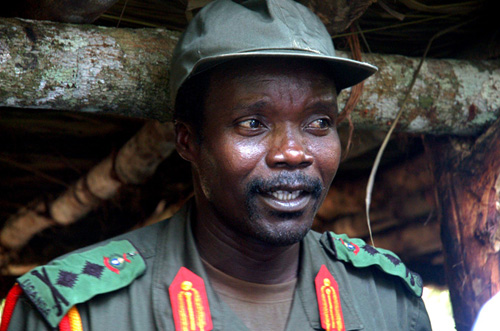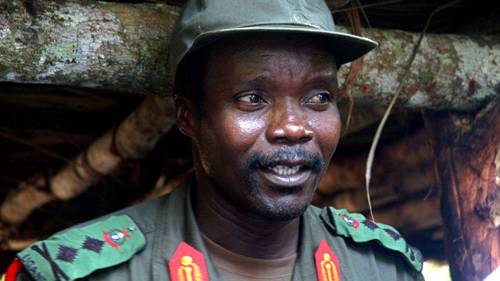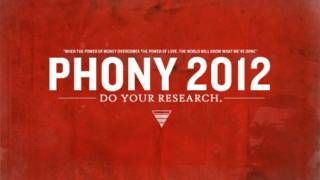Dangerous ignorance: The hysteria of Kony 2012
Source: aljazeera.com
From Kampala, the Kony 2012 hysteria was easy to miss. I’m not on Facebook or Twitter. I don’t watch YouTube and the Ugandan papers didn’t pick up the story for several days. But what I could not avoid were the hundreds of emails from friends, colleagues, and students in the US about the video by Invisible Children and the massive online response to it.
The hunt for Joseph Kony is the perfect excuse for US militarisation of oil-rich Uganda. Photo: AP
I have not watched the video. As someone who has worked in northern Uganda and researched the war there for more than a decade, much of it with a local human rights organisation based in Gulu, the Invisible Children organisation and their videos have often left me infuriated - I remember the sleepless nights after I watched their "Rough Cut" film for the first time with a group of students, after which I tried to explain to the audience what was wrong with the film while on stage with one of the filmmakers.
My frustration with the group has largely reflected the concerns expressed so convincingly by those online critics who have been willing to bring the fury of Invisible Children’s true believers down upon themselves in order to point out what is wrong with this group’s approach: the warmongering, the narcissism, the commercialisation, the reductive and one-sided story they tell, their portrayal of Africans as helpless children in need of rescue by white Americans.
As a result of Invisible Children’s irresponsible advocacy, civilians in Uganda and central Africa may have to pay a steep price in their own lives so that a lot of young Americans can feel good about themselves, and a few can make good money. This, of course, is sickening, and I think that Kony 2012 is a case of Invisible Children having finally gone too far. They are now facing a backlash from people of conscience who refuse to abandon their capacity to think for themselves.
But, as I said, I wouldn’t have known about Kony 2012 if it hadn’t been for the emails I’ve been receiving from the US. And that, I think, is telling. Kony 2012 and the debate around it are not about Uganda, but about America. Uganda is largely just the stage for a debate over the meaning of political activism in the US today. Likewise, in my view, the Kony 2012 campaign itself is basically irrelevant here in Uganda, and perhaps the best approach might be to just ignore it. This is for a couple reasons.
First, because Invisible Children’s campaign is a symptom, not a cause. It is an excuse that the US government has gladly adopted in order to help justify the expansion of their military presence in central Africa. Invisible Children are "useful idiots", being used by those in the US government who seek to militarise Africa, to send more and more weapons and military aid, and to bolster the power of states who are US allies.
The hunt for Joseph Kony is the perfect excuse for this strategy - how often does the US government find millions of young Americans pleading that they intervene militarily in a place rich in oil and other resources? The US government would be pursuing this militarisation with or without Invisible Children - Kony 2012 just makes it a little easier. Therefore, it is the militarisation we need to worry about, not Invisible Children.
Second, because in northern Uganda, people’s lives will be left untouched by this campaign, even if it were to achieve its stated objectives. This is not because all the problems have been resolved in the years since open fighting ended, but because the very serious problems people face today have little to do with Kony.
The most significant problem people face is over land. Land speculators and so-called investors, many foreign, in collaboration with the Ugandan government and military, are grabbing the land of the Acholi people, land that the Acholi were forced from a decade ago, when the government herded them into internment camps.
Another serious problem is so-called "nodding disease" - a deadly illness that has broken out among thousands of children who had the bad luck to be born and grown in the camps, subsisting on relief aid. Indeed, the problems people face today are the legacy of the camps, where more than a million Acholi were forced to live, and die - for years - by their own government as part of a counterinsurgency that received essential support from the US government and from international aid agencies.
Which brings up the question that I am constantly asked in the US: "What can we do?", where "we" tends to mean relatively privileged US citizens. In response, I have a few proposals:
The first, perhaps not surprising from a professor, is to learn. The conflict in northern Uganda and central Africa is complicated, but not impossible to understand. For several years, I have taught an undergraduate class on the conflict, and although it takes some time and effort, the students end up being well informed and able to come to their own opinions about what can be done. (I am more than happy to share the syllabus with anyone interested!)
In terms of activism, the first step is to re-think the question: Instead of asking how the US can intervene in order to solve Africa’s conflicts, we need to ask what we are already doing to cause those conflicts in the first place. How are we, as consumers, contributing to land grabbing and to the wars ravaging this region? How are we, as US citizens, allowing our government to militarise Africa in the name of the "War on Terror" and its effort to secure oil resources?
These are the questions that we who represent Kony 2012’s target audience must ask ourselves, because we are indeed responsible for the conflict in northern Uganda - responsible for helping to cause and prolong it. It is not, however, our responsibility, as Invisible Children encourages us to believe, to try to end the conflict by sending in military force. In our desire to ameliorate suffering, we must not be complicit in making it worse.
Adam Branch is senior research fellow at the Makerere Institute of Social Research, Uganda, and assistant professor of political science at San Diego State University, US. He is the author of Displacing Human Rights: War and Intervention in Northern Uganda.
A version of this article first appeared on the CIHA Blog at UC Irvine.
Article from: aljazeera.com






















